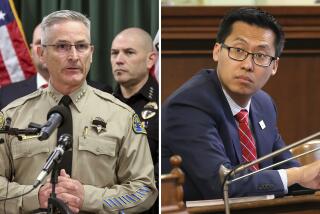Preemptive Strike : Wilson’s ‘McCarthyism’ Message Will Warn Voters to Expect Harsh Tactics From Opponent for Senate
- Share via
Determined to throw the first punch of the fall campaign, Sen. Pete Wilson, in a statement previewing the debut of an expensive television ad campaign, is accusing his Democratic challenger of engaging in “McCarthyism.”
A play on the name of his opponent--Lt. Gov. Leo McCarthy--the TV commercials, say Wilson aides, warn voters to expect “untrue charges and innuendo.” This warning, issued before McCarthy has said anything, is typical of Wilson’s poison-pill strategy. Long fearful that McCarthy will launch a hard-hitting TV campaign, Wilson is trying to discredit his opponent’s message ahead of time.
A spokesman for the Wilson campaign said Monday that the senator’s commercials, featuring the voice of actor Charlton Heston, will begin today and run for at least a week in Los Angeles, San Diego, the San Francisco Bay Area and the Sacramento environs.
McCarthy, who put his campaign in mothballs during the summer after a series of spring misfires, has made it clear he believes that his chances of upsetting Wilson will live or die on the strength of his television commercials. Opinion polls show McCarthy trailing Wilson by 10 to 12 points.
“We need to beat the hell out of Pete Wilson on TV,” said one of McCarthy’s aides recently.
Behind the scenes, officials of his own party, even members of his own campaign staff, say that McCarthy has not done what a challenger who lacks great personal magnetism must do to win--give people a compelling reason to vote against the incumbent.
Campaign rhetoric by both candidates is expected to dispute the other’s claims of fidelity to working people, senior citizens, law enforcement and the environment.
Speaking to Labor Day audiences across the state, McCarthy depicted Wilson as an elitist who would cut Social Security benefits, deny workers the right to have 60 days’ notice before plant closings and offer scant assistance to working families with child care needs.
“Mr. Wilson spends his time bringing comfort to the very comfortable,” McCarthy said at a picnic in Sacramento.
Political observers say that for McCarthy to win, he must reverse the image that Wilson has worked assiduously to project--that he is a sensitive conservative who subordinates ideology to the needs of a broad spectrum of Californians from Jews to Asians to AIDS victims.
Wilson, on the other hand, continues to describe McCarthy as an old-fashioned liberal who is out of step with most voters in the state.
Both sides are anticipating an especially heated fight over the candidates’ records on crime. McCarthy contends that Wilson grandstands as a law and order zealot while frequently voting to cut federal funds for the war on drugs. Wilson, as he did on Monday, regularly accuses McCarthy of being “weak and soft on crime” and points to McCarthy’s support for former California Chief Justice Rose Elizabeth Bird as evidence.
On Labor Day, however, McCarthy made a rather subdued entry into the fall campaign. Speaking in Los Angeles, Alameda County and Sacramento, he called for a renewed partnership between labor and business to enable the United States to hold its own in an increasingly competitive world marketplace.
As they have on other occasions, McCarthy’s remarks echo one of the main themes of the Democratic presidential campaign of Gov. Michael Dukakis. It is the argument that economic rearmament stressing job creation is more important to the nation’s future than the kind of military expenditures called for by Vice President George Bush and Wilson.
Labor Day campaigning did highlight fundamental differences between the two Senate candidates. Wilson began the day with a tour of a Long Beach defense subcontracting firm, where he was treated to a demonstration of how Titan missile parts are tested for flaws.
It was an appropriate setting for a politician who has emerged as one of the Senate’s more fervent advocates of defense weaponry, including the Strategic Defense Initiative, commonly known as “Star Wars.”
Wilson offered an upbeat view of the economy, crediting the Reagan Administration and its allies in Congress with economic policies that fostered a business climate in which 17 million new jobs were created.
“I am proud of having voted for and supported the policies that have produced this unparalleled growth--this great success story of jobs and opportunity,” Wilson said.
Asked whether he supports a move in Congress to raise the national minimum wage from $3.35 to $4.55, Wilson refused to commit himself, saying he would give an answer “in a couple of weeks.” He did predict, however, that Congress would approve “some adjustment” in the minimum wage.
Reagan Supporter
Wilson, who has been loyal to Reagan on major defense and economic policy areas, was quick to point to areas where he has broken ranks with Reagan. He referred to his vote to override Reagan’s veto of a highway bill that included mass transit funds for California cities and to his support for a measure, opposed by the Administration, that cuts off federal aid to schools with programs that discriminate against women or minorities.
At a series of breakfasts and picnics sponsored by organized labor, McCarthy expressed an ominous view of the American economy, warning that the future prosperity of working people would be jeopardized by the policies of Bush and Wilson.
“My opponent voted to cut Social Security five times. By that action, he betrayed the act of faith that we gave when we instituted Social Security in this country to older Americans,” McCarthy said at a labor breakfast in Los Angeles.
McCarthy and Wilson go into the final nine weeks of the campaign with one mutual disadvantage. The race matches two hard working, journeymen politicians who have won the respect of their parties while failing to capture the public’s imagination.
Asked to comment on the styles of the two men recently, one commentator deadpanned, “McCarthy is the one in the dark suit.”
High Cost Campaign
This impression persists even though the candidates have rung up $10 million in campaign expenditures and employed some of the best image makers in the business. By November, it is expected that the two campaigns will have raised close to $25 million and quite possibly outspent any other Senate race in the country.
Most of the money will go to television campaign spots. Wilson has already spent $1.4 million on television ads aired during the spring and summer, said Otto Bos, Wilson’s campaign manager. Spokesmen for McCarthy say they expect to spend at least $4 million on their television ads. Bos said Monday that the Wilson campaign was prepared to outspend McCarthy on television “3 to 2.”
The term “McCarthyism,” coined in the 1950s, referred to the tactics of the late Sen. Joseph R. McCarthy of Wisconsin, who was widely accused of using innuendo in attacking Communists in government. In addition to the ad warning viewers of impending “McCarthyism” in the Senate campaign this year, the Wilson campaign says it will go on the air this week with a commercial aired earlier this year that pictures Wilson sitting beside an elderly victim of Alzheimer’s disease while a narrator says that the senator donated his last pay raise to charity.
In the “McCarthy” ad, narrator Heston says that character attacks are typical of past campaigns conducted by the Democratic lieutenant governor, according to a news release previewing the ad.
But grabbing the viewers’ attention this fall may prove to be unusually difficult for both Senate campaigns, in the face of heavy competition from sports and other politics. The presidential race, a logjam of insurance initiatives, the Olympics, the World Series and the possibility of two California teams in the baseball playoffs could take a heavy toll on viewer concentration.
More to Read
Get the L.A. Times Politics newsletter
Deeply reported insights into legislation, politics and policy from Sacramento, Washington and beyond. In your inbox twice per week.
You may occasionally receive promotional content from the Los Angeles Times.








